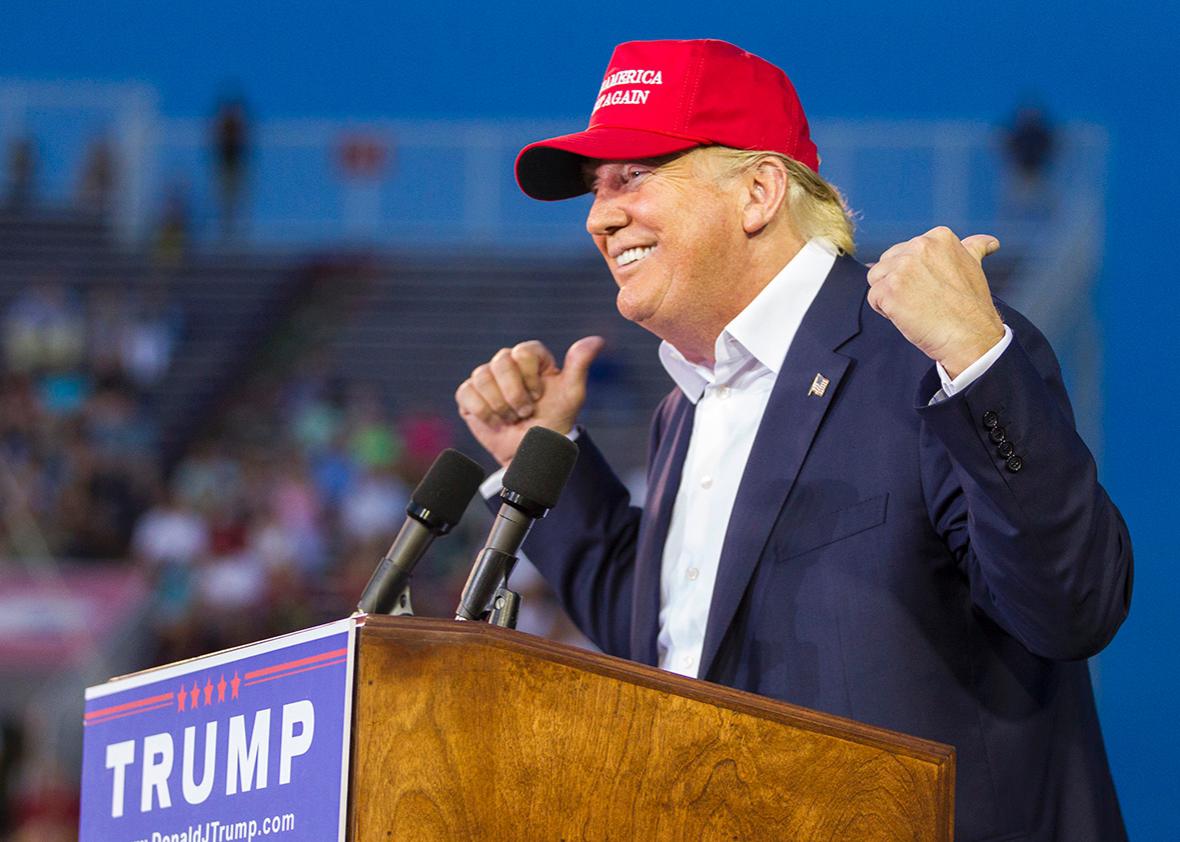The headline moment from Donald Trump’s Iowa event on Tuesday was his verbal scuffle with journalist Jorge Ramos of Univision. During a news conference, Ramos stood and peppered Trump with questions on his immigration plan, which calls for mass deportation. Trump dismissed him—“Go back to Univision”—and a guard for the candidate removed him from the room. Ramos eventually came back to the room, where Trump took his questions.
The whole exchange was dramatic, riveting TV—illustrative of Trump’s aggressive disdain for journalists, and a notch against him for the millions of Hispanic Americans who watch and respect Ramos, sometimes called the “Walter Cronkite of Latino America.”
The most interesting moment of the news conference came a little later, however, when Trump was talking about money, and fundraising in particular. Here’s what he said:
I mean, part of my thing is, frankly, I’m not controlled by anybody. These other people are raising hundreds of millions of dollars. I could do that easily. I don’t want to do that. It’s not necessary for me to do that.
Later, when asked about special interests and the Republican Party, he built on that point:
A lobbyist, a person, very good person, came to me, offered $5 million, ‘please, I want to give you $5 million for the campaign.’ I said I have no interest in taking that. In fact, it’s the first time I think he’s ever been turned down. […]
He’ll be coming to me and he’ll be saying in two years, in one year, in four years, he’ll be representing a country, maybe a company or maybe a person—I’m not doing anything for him.
All of this fits with earlier rhetoric; in early August, Trump needled his GOP rivals with this tweet: “I wish good luck to all of the Republican candidates that traveled to California to beg for money etc. from the Koch Brothers. Puppets?” Whether he knows it or not, this anti-lobbying oratory is a potent message—the kind of rhetoric that could bridge his appeal to the mainstream.
In an analysis for the Democratic Strategist and the Washington Monthly published earlier this year, pollster Stan Greenberg drew a connection between the high-dollar fundraising of modern political campaigns and the deep government distrust from working-class whites, working-class white men in particular: “While white working-class women are more likely to see campaign contributors and party leaders as having the most influence, white working-class men again cite special interest groups and lobbyists: amazingly, 60 percent say these groups hold the cards in Washington.”
For Greenberg, it’s this—more than anything else in politics—that fuels anti-government cynicism. These voters agree with progressive economic principles, he notes, but “everything they have seen says that government is gridlocked and is bought and paid for by big donors and special interests, and politicians rig the system for the most irresponsible companies.” They want government to work in their favor, but they don’t trust that it will. Instead, they assume that government will take their taxes and spend it on “individuals and corporations vastly more wealthy and powerful than themselves.”
His solution, as a Democratic pollster, is an explicit reform agenda: for Democrats to loudly commit to policies that curtail lobbying, take money out of politics, and shrink influence from special interests. If pulled off, Democrats could win working-class whites—or at least a larger portion of them—and secure their advantage in national elections.
Trump’s core appeal is nativism; more than anything else, Trump voters are against immigration. But if Trump persists through the year and into the primaries—and if he survives past Iowa and New Hampshire—then he’ll need a broader message than anger against unauthorized immigrants.
There’s almost no chance that Trump or his team has read Greenberg. But if Greenberg is right—and millions of Americans are open to an explicit message against the wealthy donors and fundraisers that dominate American politics—then Trump’s message of financial independence could be his key to a broader constituency.
Public opinion bears this out. According to a June poll from CBS News and the New York Times, 84 percent of Americans say money has “too much influence” in American elections. And 39 percent want “fundamental” changes in our system for funding political campaigns, while 46 percent say it needs complete rebuilding. Republicans terrified of a third-party Trump candidacy should consider this, as well: 58 percent of Americans say that both parties benefit equally from the vast amount of money in political campaigns.
Who better to stop special interests and wealthy corporations than a rich man who doesn’t need their money, who isn’t beholden to either party, and is ready to drive the hardest deal possible? Who better, to millions of disaffected Americans, than Trump?
